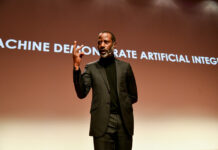Dan Strode couldn’t believe Monday had rolled around again so fast. Sleep had been at a premium during a busy ‘working’ weekend as a parent, yet his mood lifted considerably at seeing a small piece of paper on his desk. It read:
Good morning! Even the greatest weeks start with a Monday, so let’s go for it!
In that instant Santander’s global head of culture and strategy was energised. In that instant he looked forward to tackling the challenges of the day and week ahead. And he allowed himself just a little satisfaction that this note was part of a burgeoning positive company-wide culture that he had helped to design.
Culture is of course a big, complex and difficult thing to manage and shape – especially in a company of 202,000 people that operates in 32 different countries. Jon Katzenbach and colleagues at PricewaterhouseCoopers advocate looking at a few critical or keystone behaviours that are representative of culture rather than tackling culture head-on. They say that once identified and implemented these will positively influence culture across the organisation.
The Santander Way is comprised of eight behaviours; actively collaborate, bring passion, embrace change, keep promises, show respect, support people, talk straight, and truly listen. One of the key benefits of focusing on the behavioural level is that it allows people to land loftier goals on a day-to-day basis. It allows action and clarity. It’s also beyond generating value purely for the business, in that these are positive behaviours that allow people to navigate the complex issues of business today. If an employee is having a bad day, perhaps encountering difficulties with a colleague or customer, these eight ways of acting may help find a way through. They may even help at home.
Recognition of positive behaviour is also important and helps to consolidate culture. In the past two years over 1.5 million instances have been formally recognised, by simply saying thank-you to a colleague with Dan adding that “what you recognise gets repeated.”
Yet specific action also requires a more general frame of reference, space to breathe. This is where values come in. In Santander these are simple, personal and fair, and allow all actions in the company, big and small to be measured against. For example, in the recent push towards digitalisation of the HR function a constant question is whether things can be done simpler, without the advancing complexity and feature creep that might characterise such an operation.
Success in a large company also comes down to alignment. As a strategy specialist Dan was able to bring a strategic approach to Human Resources that aligns with the overall corporate strategy and culture. Values also offer an opportunity for alignment. Peter Drucker recommended that managers identify their own values and also check alignment of those values with the context in which they operate. He noted that misalignment results in frustration and poor performance, and that belonging is a key concept for all of us to consider.
In all of this the key context is creating a culture that not only facilitates performance but one which is healthy and positive. Positive cultures are defined by their focus on people where everyone is able to become their best selves and so contribute to the success of the organisation. In the case of Santander that desire for engagement extends up to five different generations of people. Talking within the context of the company wellbeing program, BeHealthy, Dan notes that, “giving people just a little empowerment creates an incredible level of engagement.”
Yet Santander go beyond even what many organisations are doing in this space. Senior leaders are currently evaluated 50% on what they achieve and 50% on how they achieve it. It’s fair to say that big, successful companies have often been characterised by a “win at all costs” attitude, yet there are signs that society may hold business to greater account in the future. By incentivising leaders to consider the means by which they get results Santander are providing a pioneering, and positive, example. This 50/50 evaluation will be rolled out to the whole organisation within the next 3 years.
Leadership is a key ingredient in creating a positive culture. A gap was identified which recognised the need to better support the organisation’s senior leaders, for their own and teams’ performance. A nine-month project involving hundreds of people around the world was undertook during which they asked what they want a leader to look like, the leadership skillset needed to prosper, and other key factors. Dan is proud of these commitments, “not just for what they are, but what they represent: a truly crowd-sourced, made by the people, piece of our culture.”
Together with the eight behaviours and three values, the four leadership commitments that resulted from this exercise form the overall cultural framework for the company. Being open and inclusive, Inspiring and executing transformation, Leading by example and Encouraging your team to prosper are the final pieces in the cultural jigsaw.
In today’s agile, collaborative age, the need for leaders to become more emotionally intelligent is well known. The machine age will require more heart and humanity from our leaders, to be more of a servant than a hero, bringing a positive approach that will prevent any framework from being a static blueprint, maintaining the pulse of the organisation and getting the best out of others with their many small, yet critical actions. Like leaving a note on someone’s desk on a Monday morning.
That note on Dan’s desk was a part of Santander Week, a company-wide initiative to share their common culture, bring colleagues together, and see they are part of a global organisation helping people and businesses to prosper every day. Dan knows there’s a way to go, but prides himself on the framework that is now in place. Can you begin to shape a positive culture for 202,000 people starting with a tiny note containing 15 words? Absolutely.
About the Author
 Dr. Steven MacGregor is the CEO of The Leadership Academy of Barcelona [LAB] an executive education provider and management consultancy with clients including McKinsey, Telefónica and Uber. A Visiting Fellow at the Glasgow School of Art he teaches on open and custom programs at IMD, IE, IESE and CEIBS. Formerly a visiting researcher at Stanford and Carnegie-Mellon he is the author of Chief Wellbeing Officer (LID 2018)and Sustaining Executive Performance (Pearson 2015). His twitter handle is @spmacg.
Dr. Steven MacGregor is the CEO of The Leadership Academy of Barcelona [LAB] an executive education provider and management consultancy with clients including McKinsey, Telefónica and Uber. A Visiting Fellow at the Glasgow School of Art he teaches on open and custom programs at IMD, IE, IESE and CEIBS. Formerly a visiting researcher at Stanford and Carnegie-Mellon he is the author of Chief Wellbeing Officer (LID 2018)and Sustaining Executive Performance (Pearson 2015). His twitter handle is @spmacg.




































